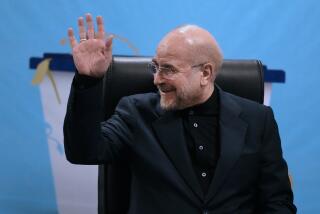Much Hangs on Afghan Vote
- Share via
Presidential elections in Afghanistan, once set for April and then for September, are now scheduled for October. Give credit to more than 7 million Afghans who have registered to vote while dodging warlord armies killing rival fighters, Taliban gunmen battling U.S. soldiers and criminals making the streets of major cities danger zones.
A paucity of NATO peacekeeping troops has made security such a problem in much of the country that parliamentary elections -- originally scheduled to be held at the same time -- have been put off until next year because they are tougher to organize. That even presidential elections may be held this year is testament to the hundreds of volunteer organizers who spread outside the capital to register voters, often at high personal risk.
President Hamid Karzai is the unsurprising favorite to win a five-year term in the election, Afghanistan’s first in 40 years. The intervening decades have been a sorry period of assassinations, a Soviet invasion and rule by the Taliban, hosts to Al Qaeda and Osama bin Laden. A victory would give Karzai the legitimacy he lacks as the leader installed just over two years ago by a loya jirga -- grand council -- heavily influenced by Washington.
Karzai has made some overdue moves recently, including dropping the defense minister, Mohammed Qassim Fahim, as one of his two vice presidential running mates. Fahim has refused to disarm his militia, estimated at 50,000 men, despite demands by Karzai and many foreign aid organizations. The United States used Fahim and other warlords to help drive the Taliban from power after Al Qaeda’s Sept. 11 attacks, but it was a mistake to let them retain their soldiers and territory. They have grown stronger as the months passed. They grab taxes that should go to the central government. Many take cuts from the opium crops that are flourishing.
On Wednesday, Fahim announced he would support Younis Qanooni, who resigned as education minister last week to run against Karzai and is considered the strongest of probably dozens of challengers. Qanooni and Fahim are both leaders of the Northern Alliance, the militia that battled the Soviet invaders and later the Taliban; the militia also assisted U.S. soldiers. Fahim is an ethnic Tajik, as is the man Karzai chose to replace him as a vice presidential candidate, Ahmed Zia Masoud. Karzai belongs to the Pushtun community, concentrated in the south and east as well as in western Pakistan. The Taliban also draws much of its support from the Pushtuns.
The U.S. gave Afghanistan short shrift in its eagerness to invade Iraq. By stepping in with money and more security forces in advance of the elections, the U.S. could give a belated push to long-term security in a nation long without it. Afghanistan was pushed into the shadows by Iraq, but failed elections would bring it back front and center as the Taliban grabbed again for control.
More to Read
Sign up for Essential California
The most important California stories and recommendations in your inbox every morning.
You may occasionally receive promotional content from the Los Angeles Times.








